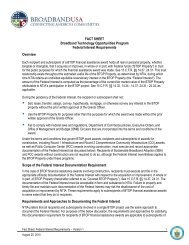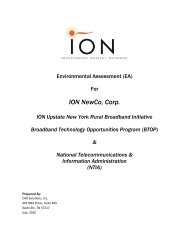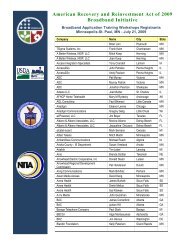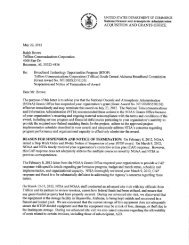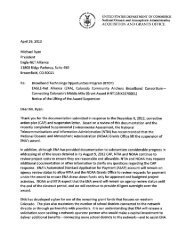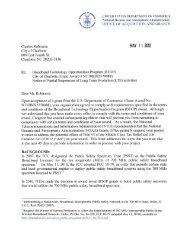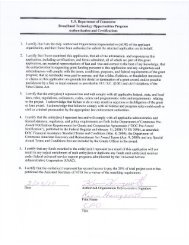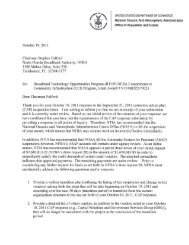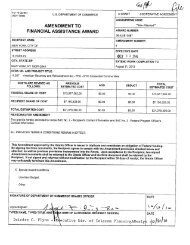BTOP's Sale/Lease Restriction, Indefeasible Rights-of-Use, and Fi
BTOP's Sale/Lease Restriction, Indefeasible Rights-of-Use, and Fi
BTOP's Sale/Lease Restriction, Indefeasible Rights-of-Use, and Fi
Create successful ePaper yourself
Turn your PDF publications into a flip-book with our unique Google optimized e-Paper software.
FACT SHEETBroadb<strong>and</strong> Technology Opportunities Program (BTOP)BTOP’s <strong>Sale</strong>/<strong>Lease</strong> <strong>Restriction</strong>, <strong>Indefeasible</strong> <strong>Rights</strong>-<strong>of</strong>-<strong>Use</strong>, <strong>and</strong> <strong>Fi</strong>ber SwapsOverviewBoth BTOP Notices <strong>of</strong> Funds Availability (NOFAs) prohibit the sale or lease <strong>of</strong> award-funded broadb<strong>and</strong> facilities orequipment during their useful life unless NTIA grants a waiver. See Notice <strong>of</strong> Funds Availability <strong>and</strong> Solicitation <strong>of</strong>Applications, 74 Fed. Reg. 33014, 33123 (July 9, 2009) (“<strong>Fi</strong>rst NOFA”); Notice <strong>of</strong> Funds Availability <strong>and</strong> Solicitation <strong>of</strong>Applications, 75 Fed. Reg. 3792, 3810 (Jan. 22, 2010) (“Second NOFA”). This prohibition (the “<strong>Sale</strong>/<strong>Lease</strong><strong>Restriction</strong>”) is not intended to limit infrastructure awardees from “leasing facilities to another service provider for theprovision <strong>of</strong> broadb<strong>and</strong> services.” See <strong>Fi</strong>rst NOFA at 33123; Second NOFA at 3810.The <strong>Sale</strong>/<strong>Lease</strong> <strong>Restriction</strong> may apply to an indefeasible right-<strong>of</strong>-use (IRU) arrangement that a recipient orsubrecipient conveys to another party for the use <strong>of</strong> BTOP-funded facilities. If the <strong>Sale</strong>/<strong>Lease</strong> <strong>Restriction</strong> applies, therecipient must either request a project-specific waiver or comply with the terms <strong>of</strong> NTIA’s partial programmatic waiver<strong>of</strong> the <strong>Sale</strong>/<strong>Lease</strong> <strong>Restriction</strong>, as described in the “<strong>Sale</strong> or <strong>Lease</strong> <strong>of</strong> Property Purchased with Award Funds” SpecialAward Condition (“<strong>Sale</strong>/<strong>Lease</strong> IRU SAC”) attached to each BTOP Infrastructure award.Application <strong>of</strong> the <strong>Sale</strong>/<strong>Lease</strong> <strong>Restriction</strong> to IRUsThe structure <strong>of</strong> an IRU determines whether the <strong>Sale</strong>/<strong>Lease</strong> <strong>Restriction</strong> applies. For example, the <strong>Sale</strong>/<strong>Lease</strong><strong>Restriction</strong> is not relevant to an IRU for capacity that is structured as a service agreement because it is not a sale orlease <strong>of</strong> facilities; therefore, no waiver is necessary. Additionally, an IRU structured as an operating lease to anotherbroadb<strong>and</strong> service provider for the provision <strong>of</strong> broadb<strong>and</strong> services would fall within the NOFAs’ exception for leasingfacilities to another service provider for the provision <strong>of</strong> broadb<strong>and</strong> services.However, an IRU structured as a capital lease normally will not fall within this general exception because, underGenerally Accepted Accounting Principles (GAAP), the lessor treats the lease in a manner akin to the sale <strong>of</strong> acapital asset. Accordingly, when a recipient or subrecipient intends to convey an IRU in the form <strong>of</strong> a capital lease, orpurchase agreements, the recipient must either:• Notify NTIA in advance <strong>of</strong> the proposed transaction <strong>and</strong> obtain a project-specific waiver <strong>of</strong> the <strong>Sale</strong>/<strong>Lease</strong><strong>Restriction</strong> from NTIA; or• Take advantage <strong>of</strong> the <strong>Sale</strong>/<strong>Lease</strong> IRU SAC, provided that the IRU falls within the scope <strong>of</strong> NTIA’s partialprogrammatic waiver.The <strong>Sale</strong>/<strong>Lease</strong> IRU SACOn February 25, 2011, NTIA granted a partial programmatic waiver <strong>of</strong> the <strong>Sale</strong>/<strong>Lease</strong> <strong>Restriction</strong> to the extent thatrecipients or subrecipients provide IRUs in BTOP-funded fiber optic networks to other broadb<strong>and</strong> service providersfor the provision <strong>of</strong> broadb<strong>and</strong> service. The conditions <strong>of</strong> the waiver are described in the <strong>Sale</strong>/<strong>Lease</strong> IRU SACattached to each BTOP Infrastructure award. One <strong>of</strong> these conditions requires the purchaser <strong>of</strong> the IRU to providebroadb<strong>and</strong> service <strong>and</strong> to adhere to BTOP’s nondiscrimination <strong>and</strong> interconnection obligations. Sample IRU contractlanguage is provided at the end <strong>of</strong> this Fact Sheet to assist recipients <strong>and</strong> subrecipients in properly accounting for theIRU SAC in their IRU contracts.<strong>Sale</strong>/<strong>Lease</strong> <strong>and</strong> IRU Fact SheetNovember 20121
The “<strong>Sale</strong>/<strong>Lease</strong> IRU SAC Checklist” included with this Fact Sheet is intended to help recipients or subrecipientsdetermine whether their transactions are structured in a manner that allows them to take advantage <strong>of</strong> the waiverdescribed in the <strong>Sale</strong>/<strong>Lease</strong> IRU SAC. Recipients <strong>and</strong> subrecipients may take advantage <strong>of</strong> the <strong>Sale</strong>/<strong>Lease</strong> IRU SAConly if all <strong>of</strong> the conditions in the checklist are met.If a recipient or subrecipient intends to sell or lease BTOP-funded assets in a lease transaction that does not meet all<strong>of</strong> the conditions <strong>of</strong> the <strong>Sale</strong>/<strong>Lease</strong> IRU SAC, the recipient or subrecipient must notify NTIA in advance <strong>of</strong> theproposed transaction <strong>and</strong> request a waiver.<strong>Fi</strong>ber SwapsThe <strong>Sale</strong>/<strong>Lease</strong> IRU SAC does not cover fiber swap arrangements (i.e., in-kind exchanges <strong>of</strong> an IRU on onesegment <strong>of</strong> fiber for an IRU on another segment <strong>of</strong> fiber). Therefore, if a recipient or subrecipient intends to engage ina fiber swap involving BTOP-funded facilities, the recipient or subrecipient must notify NTIA in advance <strong>of</strong> theproposed transaction <strong>and</strong> request a waiver.In evaluating proposed fiber swaps, NTIA will consider the value <strong>of</strong> the fiber segments being exchanged to determinewhether the transaction is for adequate consideration. Recipients or subrecipients must provide specific informationconcerning the assets to be exchanged <strong>and</strong> the methodology for valuing them. They also must explain why thetransaction is in the best interests <strong>of</strong> the federal government <strong>and</strong> those served by the project. The BTOPnondiscrimination <strong>and</strong> interconnection provisions will apply to the assets the BTOP recipient obtains in the fiber swaptransaction, <strong>and</strong> not to the assets that are provided to the other party.Additional ResourcesFor additional information pertaining to the <strong>Sale</strong>/<strong>Lease</strong> <strong>Restriction</strong> <strong>and</strong> the BTOP nondiscrimination <strong>and</strong>interconnection requirements, please refer to the following resources:• <strong>Fi</strong>rst NOFA, 74 Fed. Reg. 33014 (July 9, 2009), available at:http://www.ntia.doc.gov/files/ntia/publications/fr_bbn<strong>of</strong>a_090709.pdf• Second NOFA, 75 Fed. Reg. 3792 (Jan. 22, 2010), available at:http://www.ntia.doc.gov/files/ntia/publications/fr_btopn<strong>of</strong>a_100115_0.pdf• BTOP Nondiscrimination <strong>and</strong> Interconnection Obligations Fact Sheet, available at:http://www2.ntia.doc.gov/files/Interconnection_Nondiscrimination_11_10_10_FINAL.pdf• BTOP Federal Interest Documentation Requirements Fact Sheet, available at:http://www2.ntia.doc.gov/files/fact_sheet_federal_interest_082510_v2_1.pdf<strong>Sale</strong>/<strong>Lease</strong> <strong>and</strong> IRU Fact SheetNovember 20122
<strong>Sale</strong>/<strong>Lease</strong> IRU SAC ChecklistRecipients <strong>and</strong> subrecipients may take advantage <strong>of</strong> the <strong>Sale</strong>/<strong>Lease</strong> IRU SAC only if all <strong>of</strong> the conditions in thechecklist below are met. If a recipient or subrecipient intends to convey BTOP-funded assets in a lease transactionthat does not meet the criteria below, the recipient must notify NTIA in advance <strong>of</strong> the proposed transaction <strong>and</strong>request a waiver. The facility to be leased must be a fiber optic facility (e.g., dark fiber, wavelengths, associated electronics) The purchaser must be a broadb<strong>and</strong> service provider that will use the facilities to provide broadb<strong>and</strong> service No entity or group <strong>of</strong> affiliated entities may: (i) obtain IRUs in a majority share <strong>of</strong> the capacity available forpurchase at the time <strong>of</strong> the transaction on any fiber route constructed with BTOP funds; <strong>and</strong>/or (ii)cumulatively obtain a majority <strong>of</strong> the initial total capacity on any such fiber routes The IRU must not convey to the purchaser legal title to any property, such as fiber or other equipment The IRU must be provided in exchange for money, <strong>and</strong> not for other assets (i.e., not a fiber swap) The IRU agreement must: (i) require the purchaser to provide broadb<strong>and</strong> service <strong>and</strong> adhere to BTOP’snondiscrimination <strong>and</strong> interconnection obligations (see sample language on the next page <strong>of</strong> this FactSheet); <strong>and</strong> (ii) advise the purchaser that failure to meet these conditions will result in revocation <strong>of</strong> the IRU The IRU agreement must acknowledge that the property is subject to the Federal Interest for its useful life.See 15 C.F.R. §§ 14.30-37 <strong>and</strong> 24.31-34 (as applicable)<strong>Sale</strong>/<strong>Lease</strong> <strong>and</strong> IRU Fact SheetNovember 20123
SAMPLE — IRU SAC Contract Language Regarding Nondiscrimination <strong>and</strong> Interconnection Obligations1.1 <strong>Use</strong>; Nondiscrimination <strong>and</strong> InterconnectionARTICLE 1. SPECIAL AWARD CONDITION LANGUAGE(a)In entering into this Agreement, Recipient will use the Recipient <strong>Fi</strong>bers to provide broadb<strong>and</strong> service.(b) In making use <strong>of</strong> the Recipient <strong>Fi</strong>bers, Recipient will, consistent with the requirements governing theBroadb<strong>and</strong> Technology Opportunities Program, 75 Fed. Reg. 3792 (Jan. 22, 2010):(i)(ii)(iii)adhere to the FCC’s Open Internet Rules, 47 C.F.R. §§ 8.1 – 8.17, <strong>and</strong> any subsequent rulingsrelated to such rules;provide Internet connectivity directly or indirectly; <strong>and</strong><strong>of</strong>fer interconnection, where technically feasible without exceeding current or reasonablyanticipated capacity limitations, at reasonable rates <strong>and</strong> terms to be negotiated with requestingparties, which shall include both the ability to connect to the public Internet <strong>and</strong> physicalinterconnection for the exchange <strong>of</strong> traffic.(c) The Parties acknowledge <strong>and</strong> agree that the requirements in Article 1.1(b) do not apply to any facilities otherthan the Recipient <strong>Fi</strong>bers, including, but not limited to, any <strong>of</strong> Recipient’s existing network arrangements, except asmay otherwise be required by applicable law.(d) The Parties acknowledge <strong>and</strong> agree that the FCC’s Open Internet Rules referenced in Article 1.1(b)(i) aresubject to judicial review in a case currently pending in the United States Court <strong>of</strong> Appeals for the D.C. Circuit,Verizon v. FCC, No. 11-1355 (D.C. Cir.). The Parties further acknowledge <strong>and</strong> agree that Recipient will have nocontractual obligation to comply with the FCC’s Open Internet Rules in the event those rules are vacated or otherwiseheld to be unlawful by a final court order.(e) Recipient certifies that it will use the Recipient <strong>Fi</strong>bers to meet its current <strong>and</strong> reasonably anticipatedbroadb<strong>and</strong> capacity needs <strong>and</strong> that it is not entering into this Agreement to acquire unnecessary capacity that wouldprevent other service providers from providing a competing broadb<strong>and</strong> service. Based on such certification, theParties acknowledge <strong>and</strong> agree that Recipient has shown that it would not be technically feasible to <strong>of</strong>ferinterconnection pursuant to Article 1.1(b)(iii) above <strong>and</strong> Recipient shall not be required to comply with this condition.(f) The Parties acknowledge <strong>and</strong> agree that any final, non-appealable order issued by either the FCC or NTIAfinding that Recipient has violated the requirements in this Article 1.1 will result in the termination <strong>of</strong> this Agreement.<strong>Sale</strong>/<strong>Lease</strong> <strong>and</strong> IRU Fact SheetNovember 20124




